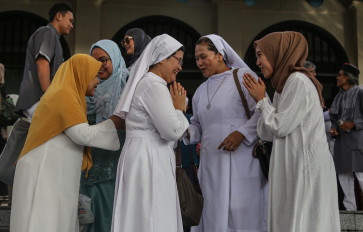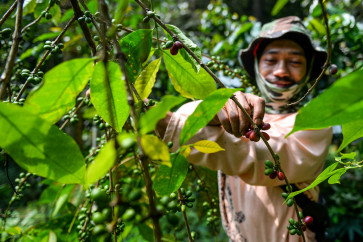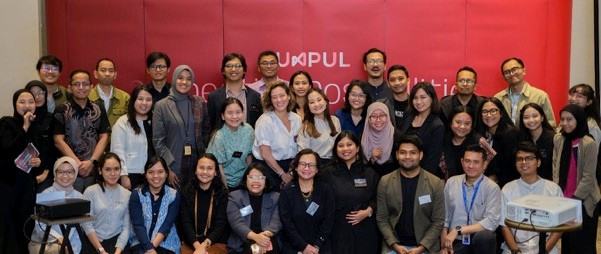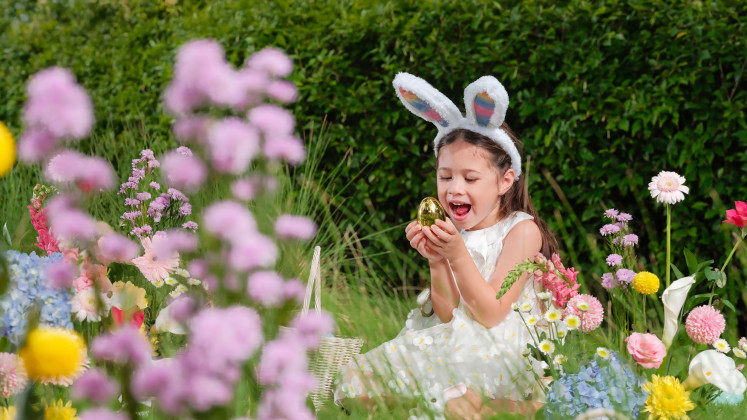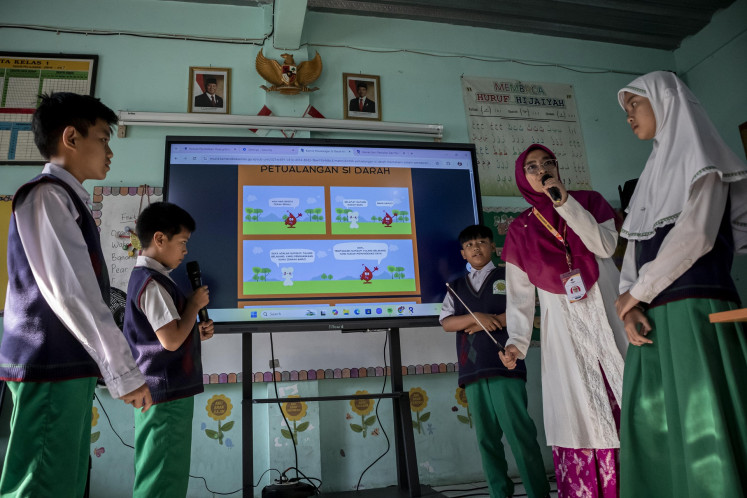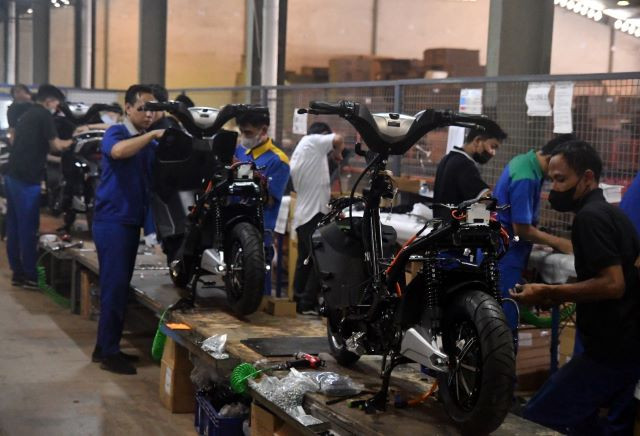Schneider Electric strengthens commitment to sustainability in Indonesia
Change text size
Gift Premium Articles
to Anyone
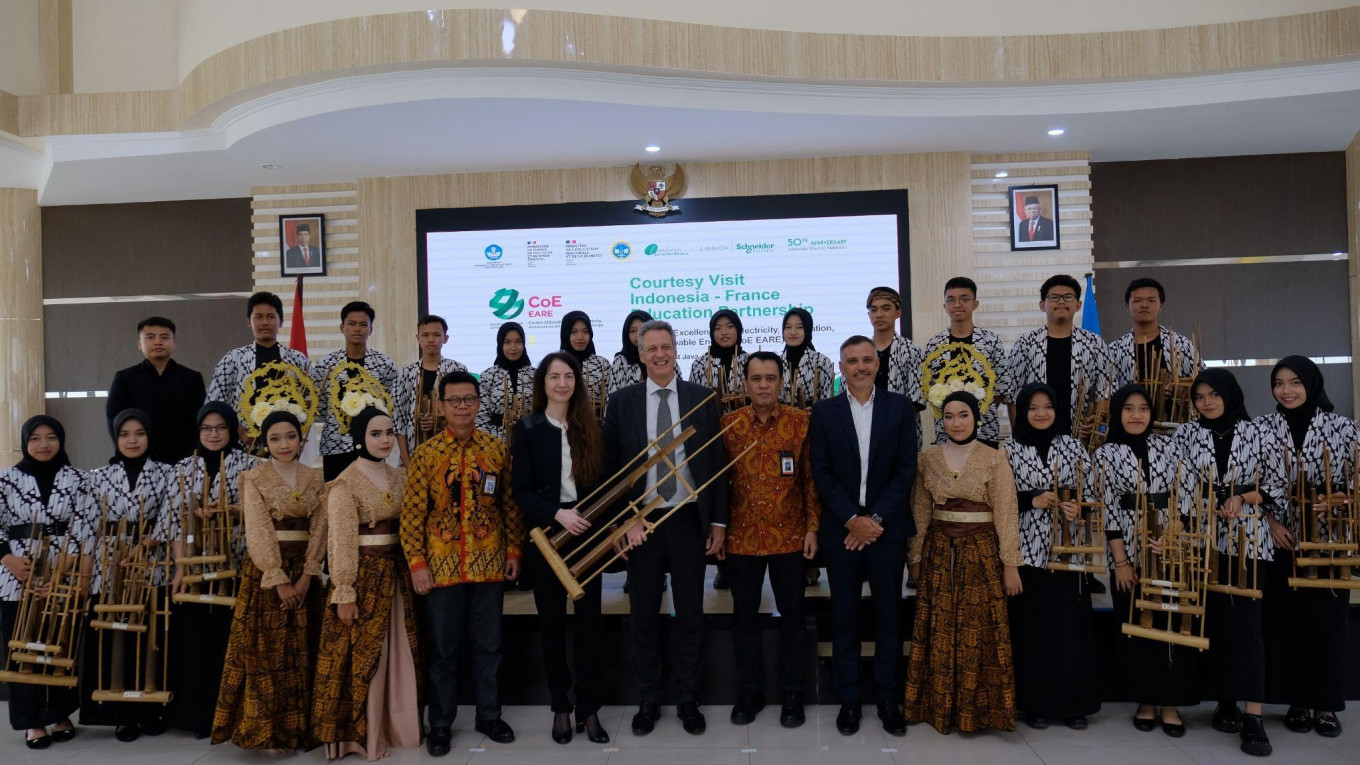 Gwenaelle Avice-Huet (seventh left, front row), Chief Strategy & Sustainability Officer at Schneider Electric, poses with students of the Centre of Excellence for Electricity, Automation and Renewable Energy (CoE EARE), a vocational school located in Cimahi, West Java, that Schneider Electric Indonesia established in cooperation with the Indonesian Ministry of Education, Culture, Research and Technology, French Ministry for National Education and Youth, and Schneider Electric Foundation.
Gwenaelle Avice-Huet (seventh left, front row), Chief Strategy & Sustainability Officer at Schneider Electric, poses with students of the Centre of Excellence for Electricity, Automation and Renewable Energy (CoE EARE), a vocational school located in Cimahi, West Java, that Schneider Electric Indonesia established in cooperation with the Indonesian Ministry of Education, Culture, Research and Technology, French Ministry for National Education and Youth, and Schneider Electric Foundation.
O
n March 24, Gwenaelle Avice-Huet, Schneider Electric’s global chief strategy and sustainability officer, paid a visit to the company’s two primary facilities in West Java: its Center of Excellence in Cimahi and Smart Factory in Cikarang.
An industry leader in the field of energy management and industry automation, Schneider Electric is a French multinational company that focuses on empowering all parties to make the best use of energy and resources, bridging progress and sustainability.
This most recent visit serves as a reaffirmation of Schneider’s continuous effort toward sustainability and green industry, while also signposting its focus on Indonesia as Schneider’s center of production and services for Southeast Asia region and other part of the world.
Schneider’s Smart Factory in Cikarang highlights the company’s optimized digitalization, net-zero emission sustainability systems, biodiversity focus and local community empowerment programs.
The factory also utilizes renewable energy through the use of solar panels that generate up to 228 megawatt hours (MWh) per year, resulting in a reduction of around 181 tons of carbon emissions per year, equivalent to planting approximately 900 trees each year.
Rudy Granet, the factory’s plant director, elaborated on the importance of its sustainability efforts, noting that more than 20 percent of the factory’s monthly energy consumption came from on-grid solar energy, significantly reducing the use of conventional energy and carbon footprint.
“With our current trend, we are optimistic that by 2025 we can reach 100 percent renewable energy utilization,” he said.
Schneider’s Smart Factory in Cikarang is a pragmatic example of Green Heroes for Life (GHFL), a sustainability initiative to develop a community that is aware of energy efficiency, renewable energy, automation and digitalization.
So far, Schneider’s branches in Vietnam, Thailand and Indonesia have applied this initiative, with plans to expand the campaign to other countries outside of Southeast Asia.
Meanwhile, Schneider’s Center of Excellence of Electricity, Automation and Renewable Energy (COE EARE) in Cimahi is the manifestation of a collaboration between France’s Ministry of Education, Indonesia’s Education and Culture Ministry and Schneider Electric.
Established in 2017, the COE EARE is a state-of-the-art facility that provides advanced training and research in the field of renewable energy, automation, and electricity. The initiative equips vocational school students and teachers with the right skillsets so that they are better equipped to join the workforce along with training prospective workers effectively.
As of December 2022, the COE has trained more than 24,800 vocational schools’ students and 277 teachers, and collaborated with over 144 vocational schools across Indonesia.
As an equally imperative sustainability effort, the COE is a long-term investment that cuts down on the training period for new employees because, through the program, Schneider can hire from a pre-trained pool of talent across the country.
More importantly, the COE initiative leaves a positive impact on local communities, upskilling Indonesian citizens with knowledge of electrical hardware and automation software, making them more desirable as prospective workers for any company in the industry.
To explain the importance of the COE initiative and its future plans for expansion, Avice-Huet said Schneider Electric was committed to advancing the field of renewable energy and sustainability, and a visit to the Center of Excellence was a way to demonstrate commitment to this mission.
“We have been running this initiative here for five years now, and we strongly want to keep going. Our goal is to reach over 180 vocational schools in Indonesia and to educate over 1 million youths around the world by 2025.”
Closing the visit, she also emphasized the importance of Schneider Electric's global commitment to accelerating progress on sustainability and a more equitable future through the impact company model.
The impact company model has two main parts: to do well to do good and to do good to do well. This means that Schneider aims to achieve a net-zero and a more equitable future with all stakeholders, whether that be large or small companies in Indonesia.
"As an impact company, we make a unique difference through innovation, sustainability and social responsibility. And we are truly grateful for the operating model that has been carried out so far," Avice-Huet concluded.


